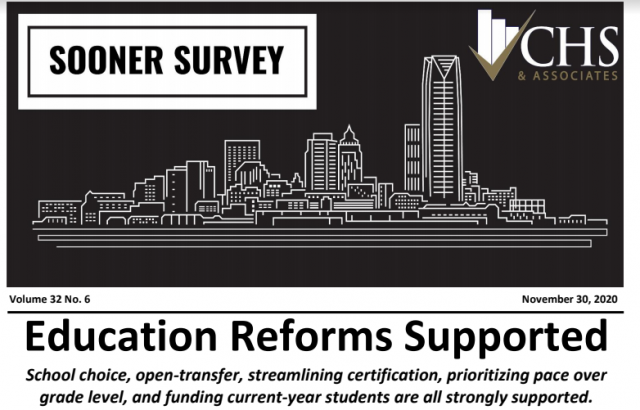

A recent poll conducted by Cole Hargrave Snodgrass & Associates showed voter support for various education reform proposals in Oklahoma.
The national education reform coalition, Yes Every Kid, commissioned the survey. Every Kid Counts Oklahoma, an education reform group, is part of this coalition and has also been tasked with dispersing millions of dollars in CARES Act funding for education.
“(The purpose of the survey was) just to better understand where Oklahomans stand on education reform issues as they work to set an agenda for their goal of improving education opportunities for every kid,” said Pat McFerron, president of CHSA.
The survey (embedded below) was completed by 500 registered voters in the state though mobile phone, land line and a text-to-web system. Results showed strong support for education issues such as school choice, funding based on enrollment and streamlining teacher certifications for professionals.
‘School choice’ favored by Republicans
In regard to parents having the ability to use tax dollars dedicated for education to send their child to their school of choice — public, private, charter or online — 61 percent of those surveyed answered in favor compared to 33 percent who opposed.
“We consistently have found that, among voters, there’s not an urban-rural split of any significance,” McFerron said. “In the Legislature, sometimes we see that urban-rural split, but among voters there’s not much difference there.”
Of those who responded, 62 percent of urban voters and 59 percent of rural voters supported the term “school choice.”
“Quite a few studies show that rural parents want more choice and options for their community,” McFerron said.
Although there isn’t much of a split between rural and urban voters regarding the issue of school choice, there is a partisan divide.
“The partisan divide on this continues to widen,” McFerron said. “Republican primary voters were very in favor of school choice, and the Democrats were evenly split.”
Of Republicans who were surveyed, 72 percent offered support for school choice, while only 44 percent of Democrats expressed support. McFerron said Democrat support for school choice is concentrated in urban metro areas.
“Minority communities in particular are very supportive of school choice options,” McFerron said. “The reality is that a lot of those Democrats in those metro areas, they’re the students that are stuck in failing schools and don’t have as many options.”
Of all respondents, 68 percent also supported open transfer policies for students to attend public schools of their choice, and 75 percent supported funding schools based on current year enrollment numbers instead of the highest enrollment year over a three-year period. Additionally, 64 percent supported moving away from grade levels and toward a subject mastering system, and 73 percent supported streamlining teacher certifications for professionals.
Robert Ruiz, executive director of ChoiceMatters, believes the survey is reflective of an increased understanding among voters of how the education system works as a result of COVID-19.
“We’ve seen a lot of parents that have become more aware of education policies that may seem out of date,” Ruiz said. “I think COVID is bringing to light a lot of the challenges and struggles, especially for parents. Even parents who have been in what we would consider strong-performing districts are starting to realize they have very little say in the education of their children.”
Ruiz also said he thinks it is important for legislators to pay attention to this survey while making policy decisions regarding education in the upcoming 2021 session.
“I’m hoping that we can see more earnest education reform,” Ruiz said.
‘Education is nuanced’
Despite survey results showing support for school choice, Oklahoma Education Association President Alicia Priest said she believes the questions were written to elicit such responses.
“The questions on the poll are skewed to promote favor in the questioning itself,” Priest said. “This survey is more about vouchers and privatizing public schools for profit than it is about meeting the education needs of our students.”
She said she worries the questions that were asked and the way they were asked takes the focus away from student achievement and implies a desired shift of public money to private hands.
“Education is nuanced,” Priest said. “It requires more than questions that are priming the pump for bad policy.”
She said public schools are offering more choice than ever before.
“Parents have options already. Parents have options for their public school’s virtual option, they have options to move their students from districts as long as the other district can accept them,” Priest said.
She also expressed concerns about support surrounding streamlining the teacher certification process for professionals.
“Not everybody should walk into a classroom and start teaching kids just because they have a degree,” Priest said. “There’s an art and a science behind educating kids, and just because you know a subject matter doesn’t mean you can reach, teach and inspire a student or a classroom of students who have a variety of different needs.”
Overall, Priest worries that the survey had an agenda.
“The reality is, this survey really seems to be a survey to push vouchers and privatizing public schools for profit,” she said. “It was failed at the national level under Betsy DeVos, and we should put it to rest here in Oklahoma.”
Full poll results
